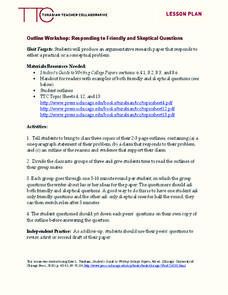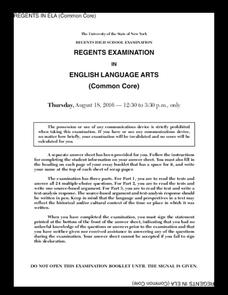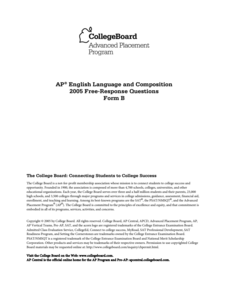Fluence Learning
Writing an Argument: Innovation in America
Are American young people prepared to become tomorrow's leaders in technological innovation, or does an obsession with being cool sidetrack essential skills? That is the question freshmen and sophomores must address in a performance task...
Prestwick House
Writing Arguments in Response to Nonfiction
Emotional appeal or argument? That is the question. An informative instructional activity helps your class recognize the difference between a logical argument and an emotional appeal and learn how to craft an argumentative response....
Santa Ana Unified School District
Persuasive Writing
Should students be paid for doing well in school? That is the question at the heart of an argumentative writing unit that walks writers through the steps of crafting a persuasive essay. The carefully scaffolded scripted plans provide...
Maryland Department of Education
The Concept of Identity Lesson 7: Logical Fallacies
What are the effects of competition in an academic environment? The competition between the main characters in A Separate Peace motivates a series of activities that asks readers to take a stance on competition, and then to develop a...
Turabian Teacher Collaborative
Parts of Argument II: Article Critique
Break down the parts of argumentative writing with a critical thinking activity. High schoolers read an article of your (or their choice), and use a graphic organizer to delineate the ways the author structures his or her arguments.
Building Evidence-Based Arguments: Grade 9
New ReviewHigh schoolers investigate the dilemma of a proportional response with a lesson about the history of terrorism and militant extremists in the United States. As they examine memos from the FBI and speeches from President Bush and Obama,...
New York State Education Department
English Language Arts Examination: January 2017
After reading literary and informational texts, scholars answer multiple-choice questions and write both a source-based argument and a text-analysis response.
Aurora City School District
Do Not Try to Kid a Kidder: The Art of Persuasion
The power to convince others of your argument lies in your knowledge of rhetoric! A thorough packet covers the basics of persuasion, including logical appeals and fallacies, and applies strategies to letters to the editor,...
Turabian Teacher Collaborative
Outline Workshop: Responding to Friendly and Skeptical Questions
Answering questions is the best way to hone and revise your argument. Foster receptive writers with a workshop activity that promotes peer editing and argumentative writing skills. Given lists of both friendly and skeptical questions,...
Alabama Learning Exchange
The Big Bang Theory: An Evidence-Based Argument
What evidence supports the big bang theory? Individuals analyze scholarly resources about the the theory and develop arguments backed by evidence. They brainstorm, share ideas, watch a video, and read articles to complete a graphic...
Turabian Teacher Collaborative
Parts of Argument III: The Claim Game
Throw down with a fun language arts game! Armed with a hand of writing-themed cards, learners craft arguments based on the strategies written on the cards, dropping cards as they discuss their claims further until there are no strategies...
Stockton University Wordpress
Civil Disobedience: Is it ever ok to break the law?
As part of a study of civil disobedience, class members read excerpts from the writings of activists who were willing to break the law to protest unjust laws.
New York State Education Department
English Language Arts Examination: June 2014
Should companies track consumers' shopping preferences without their permission? Using the resource, scholars write source-based argumentative essays to answer the question. They also answer reading comprehension questions based on an...
New York State Education Department
English Language Arts Examination: June 2017
Plants prefer classical music to rock and roll. That's one of the claims in an informational passage that makes up part of a set of standardized assessment questions. The set is part of a larger collection of English language arts tests...
New York State Education Department
English Language Arts Examination: August 2016
If it's true that preparation is the key to success, the English Language Arts Examination handout should help pupils ace their exams. Scholars read several texts and answer multiple-choice questions. Then, they write source-based...
EngageNY
Grade 9 ELA Module 4, Unit 1, Lesson 23
In "How We Researched and Wrote this Book," the final essay in Sugar Changed the World: A Story of Magic, Spice, Slavery, Freedom, and Science, authors Aronson and Budhos discuss their research methods and purpose in writing the text....
Turabian Teacher Collaborative
My Favorite Martian: Workshopping Warrants
Sometimes explaining an argument can lead to confusion and miscommunication. Narrow down the details in written arguments with a group activity in which learners pretend to be aliens from another planet, struggling to understand each...
New York State Education Department
English Language Arts Examination: January 2016
An English Language Arts exam contains 24 multiple-choice questions that individuals answer after reading informational and literary passages. Scholars then write a source-based argument and text-analysis response.
EngageNY
Grade 9 ELA Module 4, Unit 1, Lesson 18
As first-year students continue to investigate how sugar changed the world, the focus shifts to a consideration of why people with limited job options take on dangerous or subjugating work. Class members read an opinion piece by Nicholas...
EngageNY
Grade 9 ELA Module 4, Unit 1, Lesson 12
Anna McMullen's opinion piece "Bangladesh Factory Collapse: Who Really Pays for our Cheap Clothes?" offers readers another opportunity to examine how writers craft and support their arguments. After reading McMullen's article, class...
College Board
2005 AP® English Language and Composition Free-Response Questions Form B
Communication is the key. Prompts from the 2005 AP® English Language and Composition Free-Response Questions Form B allows scholars two opportunities to analyze the use of communication to express thoughts. First, pupils look at...
Southern Nevada Regional Professional Development Program
Common Core Reading Standards: Understanding Argument
What does your class know about logical fallacies? They can find out quite a bit and practice identifying logical fallacies if you follow the steps and use the resources provided here! After reviewing ethos, pathos, and logos, ask small...
K20 LEARN
Arguing With Evidence: Deconstructing Arguments Part 1
In the first lesson in a two-part series, high schoolers pick a social issue important to them and examine an article about the topic, the arguments and evidence used to support the writer's stance, and craft two counter-arguments to the...
Curated OER
Unit 2: Post-Revolution: The Critical Period 1781-1878
The post-Revolutionary Period of 1781-1787, also known as the Critical Period, is the focus of a series of lessons that prompt class members to examine primary source documents that reveal the instability of the period of the Articles of...

























